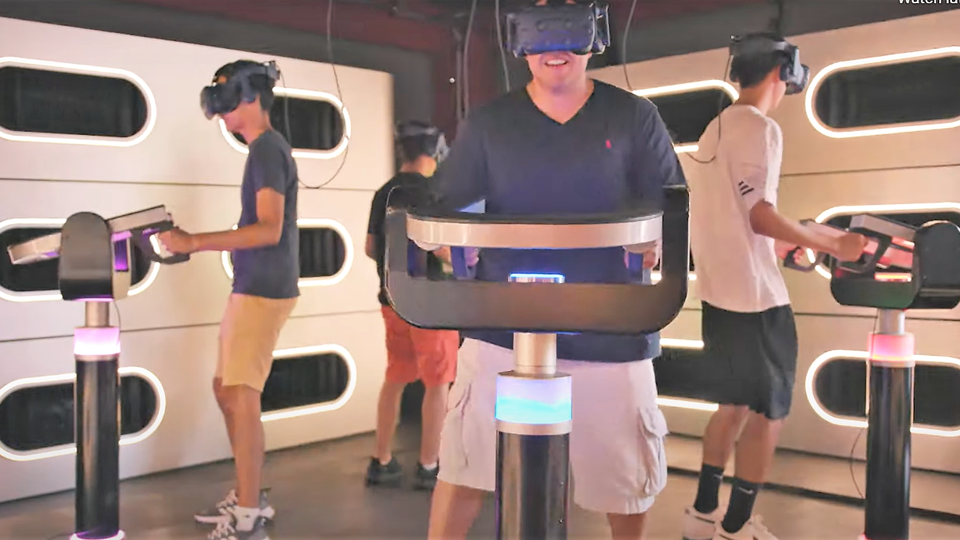Commentary
Post lockdown rebound drives more diverse VR games
Virtual reality developers continue to introduce more offerings to address a greater variety of amusement environments.

October 25, 2021 by Kevin Williams
One of the biggest takeaways from the first post-pandemic Amusement Expo International show in Las Vegas was the continued influence of virtual reality, including a smattering of self-service VR kiosk games.
VRsenal presented "Vader Immortal — Lightsaber Dojo" — the self-service VR kiosk game now superseding the success of "Beat Saber Arcade," released in the midst of the lockdown. This version has been redeveloped since its 2020 launch based on changes that have refined the game based on in-the-field testing. The updated version is seeing an increase in player engagement.
Another example of the move towards self-service VR kiosks was in the Boxblaster booth. The operation had partnered with Benchmark Games on its products, including the new "VRX-perience," a departure from the Tethered Enclosure VR platform the company had released but did make use of some of the game experiences in this new form factor. The self-service VR kiosk is a growing hardware genre.
VRstudios announced a platform with the "Fury" self-service VR modular kiosks — the latest VR kiosks to break into the market. The system was created to support the lineup of titles, including the "Hoops Madness" title, with the first of the games supporting the "Real Sports eSports" initiative.
Rilix presented two examples of its self-service, two-rider VR systems, with a selection of content running on the Oculus Go headset and a configuration of systems suitable for mall operations.
Free roaming VR continues
Free-roaming, post-lockdown VR experiences were also well represented.
Phenomena presented the "Phenomena VR Arena," a standalone VR approach for two to eight users, employing Oculus Quest 2 headsets talking to a slave PC across an Internet connection. It allows quick setup, in under an hour, and is headset agnostic, able to support Pico 3 and HTC Vive Focus 3. The arena scale platform offers the game "Versus" and the developer is working on a new title, "Space Dance Harmony."
VEX Solutions, with Shaffer Distributing Co., brought its standalone VR approach with the "VEX Arena" offering a touchscreen login for the players to register and then don their standalone (Pico) VR headsets. The company also announced "Death Squad," an e-sports module allowing operators to support league play. To support this initiative, VEX Solutions announced the launch of its own global contest, with monthly prizes on both the "VEX Adventure" and "VEX Arena" platforms to drive audience participation.
Home/facility gaming crossover
VRstudios, which revealed its "Atom" and "Flex" VR platforms, announced its "Real Sports eSports" — a range of physically active VR sports experiences that represent a crossover between home and facility gaming. Players can hone their skills using the consumer game version (@home), and then show their skills, competing on the FEC version at their local entertainment site (@FEC). The immersive attraction version is surrounded by real spectators.
With a strong mix in the amusement and attraction sector, Triotech, which has been forming partnerships with developers such as CL Corp. and BoldMove in Europe, presented its "Storm" two-seater interactive VR experience.
Creative Works demonstrated its investment in the Hologate VR range, as well as MajorMega's "Hyperdeck" four-player VR attraction. This is a system that has seen strong revenue returns, reporting an average of 13.8% of players returning to play again — revealed by a partnership with database expert Globobeet to analyze a dataset of 100,000 recent "Hyperdeck" games.
VR gaming expands at retail
Beyond the trade show, VR gaming continues to gain presence at retail.
Anvio announced its first branded North American locations, including an "Anvio VR Arena" in the heart of Hollywood in a retail mall on the famous Hollywood Boulevard. The Anvio platform offers a six-player, free-roaming competition with a library of experiences developed by the company on the Oculus Quest 2. The operation is already in discussions with distributors to supply FEC owners with zero initial investment VR solutions.
At Canada's West Edmonton Mall, Virtual Land covers some 30,000 square feet, over two floors of the mall, containing 17 VR experiences, including a number of free-roaming style games. This is another example of "retailtainment," as the VR theme park took over the space previously used by the Brocks furniture store.
This is reminiscent of what has been seen in Dubai with venues such as Hub Zero and VR Park Dubai, or in Asia with VR Park and VAR Live. Virtual Land in Canada has been developed in partnership with Taiwan-based VAR Entertainment, deploying several of its attractions such as "Over Kill" and "Zombie Jail."
The amusement/entertainment space is more exciting than ever, post-pandemic.
(Editor's note: Extracts from this blog are from recent coverage in The Stinger Report, published by KWP and its director, Kevin Williams, the leading interactive out-of-home entertainment news service covering the immersive frontier and beyond.)
About Kevin Williams
Along with advisory positions with other entrants into the market he is founder and publisher of the Stinger Report, “a-must-read” e-zine for those working or investing in the amusement, attractions and entertainment industry. He is a prolific writer and provides regular news columns for main trade publications. He also travels the globe as a keynote speaker, moderator and panelist at numerous industry conferences and events. Author of “The Out-of-Home Immersive Entertainment Frontier: Expanding Interactive Boundaries in Leisure Facilities,” the only book on this aspect of the market, with the second edition scheduled for a 2023 release.
 ChatGPT
ChatGPT Grok
Grok Perplexity
Perplexity Claude
Claude






